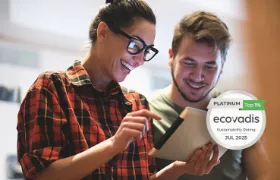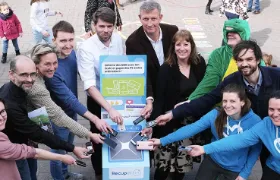Circular economy: what is it?

Our world is a treasure trove of materials with which we can make the most beautiful, most innovative products. Yet this treasure trove is not infinitely large: our natural resources are gradually running out. So now is the time to change the way we live, work and consume. From a linear to a circular economic model. It's time to transform the pattern of consuming and throwing away into an endless circle of reuse. But what exactly is this and how do we achieve this ambitious switch? And how do we do that at Proximus?
What is a circular economy?
A circular economy is based on the idea of no longer depleting raw materials but rather reusing them instead. This also reduces waste production and pollution, giving natural resources time to recover. Where there used to be the idea that everything came out of the ground indefinitely, we now know that this is not the case, and we realize that frugality is the order of the day. Globalization means that everything is within reach, which gives a boost to our innovation. However, this must not be at the expense of the health of our planet. However, these two aspects don't have to be mutually exclusive: by using a circular model that facilitates reuse of materials, we can continue to innovate with a heart for sustainability.
A circular economy starts in the development phase of a new product. Already during this phase, thought is put into the product's composition, use of materials and recyclability. At Proximus we have understood this well, and we are committed to offering products and services that last a long time. In the event of a fault we try to repair the product or bring it back into circulation by reusing as many materials as possible. Together with our partners, including Fairphone, we try to offer our customers as sustainable and circular a range of products as possible.
What are the advantages of such a circular model?
As already mentioned, a major advantage of a circular economy is that it relieves the pressure on our natural resources. In addition to the sustainable aspect, there are also many financial benefits. Together we could save around 620 million euro a year in material costs worldwide, reduce CO2 emissions by as much as half by 2030 and save around 3,000 euro a year per European household. So there's no longer any reason not to make the switch, and that's exactly why we have explicitly integrated sustainability into our new strategy, #inspire2022.
With its new strategy, Proximus is fully committed to sustainability in everything we do. Our ambitions were already high: we want to become fully circular by 2030. This is why, for example, we have set up programs to reduce the use of raw materials. This way we involve our suppliers too, of course. Together with them we opt for products designed with circularity in mind. In other words: modular products, any faulty parts of which can be easily replaced. The Fairphone smartphone, for example, meets this criterion perfectly and is, moreover, manufactured without raw materials from conflict areas.
Circular economy for and by everyone
Circularity starts with each and every one of us, and in many ways. As a company we want to set a good example to our customers, employees and partners. We motivate everyone to join us in our sustainable journey. A good example is Don't Miss the Call, where we collect old mobile phones and reuse their materials. Everyone can do his or her bit: do you still have an old smartphone lying in a drawer somewhere that you want to get rid of? Deposit it in one of our shops or at one of our partners, get at least 10 euro of pocket money for it in return and contribute to an ambitious, sustainable and circular undertaking.
Interested in this topic? Discover more about our ambition for the planet


